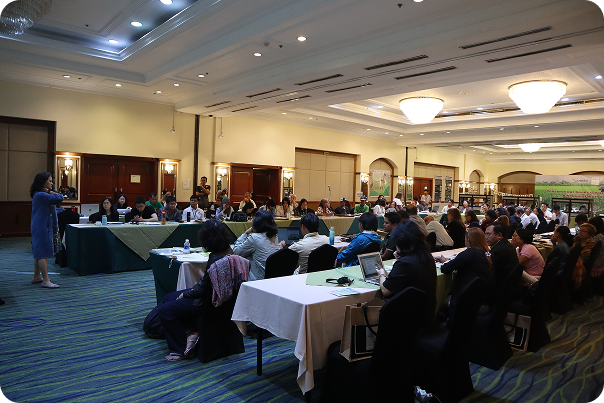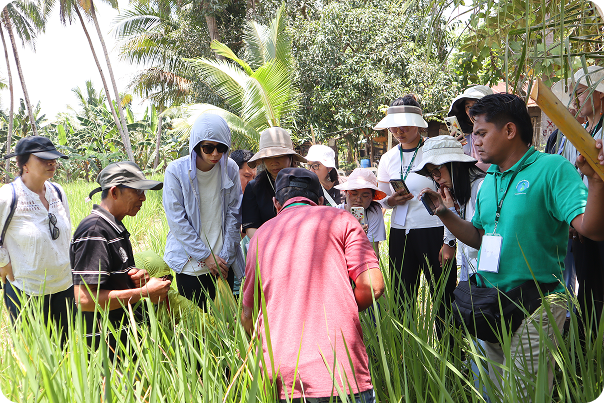Davao, Philippines. Farmers, civil society organizations, researchers, and policymakers from across Asia gathered on 7-9 April 2025 for a landmark regional workshop, “Conserve Our Seeds, Secure Our Food: A Workshop On Farmers’ Rights To Seeds,” organized by the Southeast Asia Regional Initiatives for Community Empowerment (SEARICE) with support from EarthCare Foundation. Over 3 days, 69 delegates from 11 countries collaborated to address pressing challenges in seed conservation, farmers’ rights, and sustainable agriculture.
Farmers Under Threat: Industrial Agriculture and Genetic Erosion
In her keynote presentation, Dr. Yiching Song, founder of China’s Farmers’ Seed Network (FNS), emphasized the three key elements at the heart of sustainable agriculture: seeds, food, and farmers. She underscored the critical yet often overlooked role of small-scale farmers, who constitute 40% of the global population, with over 70% living in extreme poverty. Dr. Song also warned of the alarming decline of agricultural biodiversity due to industrial farming, revealing that China lost 71.8% of its crop varieties between 1954 and 2015.
Nori Ignacio, SEARICE Executive Director, echoed this concern, underscoring the alarming consolidation of seed markets, with just two corporations dominating 40% of global seed sales, while small farmers supply 80% of seeds in developing countries. She called for policies that support both formal and traditional seed systems to enhance food security and climate resilience.
Resisting Restrictive Laws: Farmers Fight Back
In a panel on current trends and issues affecting farmer seed systems, keynote speakers shared struggles against seed privatization laws that criminalize traditional farming. Nguyen Anh Dung of Vietnam’s Dinh An Seed Club described how the country’s 2006 Intellectual Property Law nearly wiped out community seed clubs, forcing farmers to breed their own resilient varieties. Similarly, Lutfiyah Hanim from Indonesia exposed how Seed Law No. 12/1992 led to the prosecution of farmers for exchanging traditional seeds, despite a partial 2013 court victory.
Atty. Elpidio Peria, SEARICE Legal Counsel, condemned state laws and policies that criminalize farmers, advocating instead for grassroots-led seed systems integrating traditional and scientific knowledge. This approach defies the monopolistic control of seed supply by large corporations, ensuring greater access to diverse, locally adapted seed varieties and nurturing more resilient agroecological practices.
Grassroots Solutions: Seed Banks, Agroecology, and Resistance
To foster a sense of ownership and control over seed resources, local communities establish their own seed banks as an alternative to the formal seed industry. This grassroots initiative resists corporate seed monopolies by preserving seed diversity and empowering communities to reclaim control of their food systems.
Participants showcased successful community-led initiatives:
- MASIPAG (Philippines) developed 2,300+ rice varieties through farmer-led breeding.
- Laos’ National Genebank preserves 85% glutinous rice varieties, vital for food security.
- China’s FSN supports 50 community seed banks conserving 4,000+ traditional varieties.
- Peru’s Potato Park, led by Indigenous communities, safeguards 1,400+ potato varieties.
- SEARICE’s Community-Based Native Seeds Research Center (CONSERVE) preserves 800 traditional rice varieties and 300 farmer-bred varieties.
To enhance the learning experience, the participants went for field trips across North Cotabato, visiting community seed banks, integrated organic farms, farmer breeding stations, and local government units’ (LGUs) sustainable agriculture programs. This further enriched their exposure to conservation initiatives and partnerships with local government authorities.
Call to Action: Strengthen Community Seedbanks, Advocate for Supportive Policies, Expand Agroecology and Government Collaboration
The Malaysian Food Sovereignty Forum (FKMM) rallied participants to reject foreign influence in seed policies, which restrict farmers’ rights. Delegates from Cambodia, Thailand, and Myanmar also emphasized digital seed databases and cross-border advocacy to counter restrictive trade deals.
One way to achieve this goal is by leveraging legal remedies, engaging with key stakeholders, and building a compelling case. A prime example of this approach is the success shared by Benedict Kyle G. Barber of MASIPAG. In his presentation, he highlighted a landmark legal victory against GMOs in the Philippines, where the Court of Appeals halted the propagation of Golden Rice and Bt Eggplant over safety concerns.
Moving forward, the participants came up with a unified regional agenda that calls for the strengthening of local seed banks and policy advocacy, resisting UPOV 1991 and promoting pro-farmer laws, expanding agroecology and government collaboration, and launching online seed banks and public seed conservation campaigns.
Nori Ignacio closed the workshop with a powerful call to action, urging sustained resistance and solidarity: “Our seeds, our rights, and our future depend on collective action. We must stand firm against policies that erase the farmers’ contributions.”


